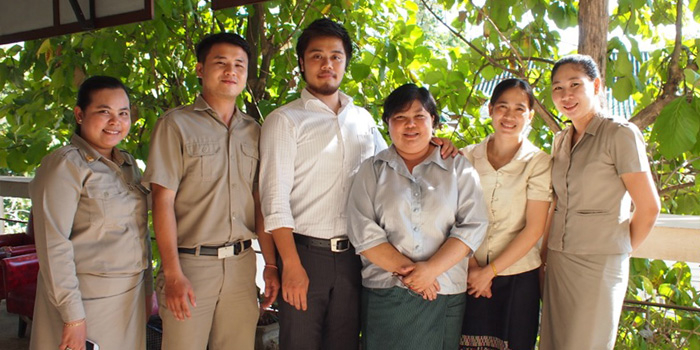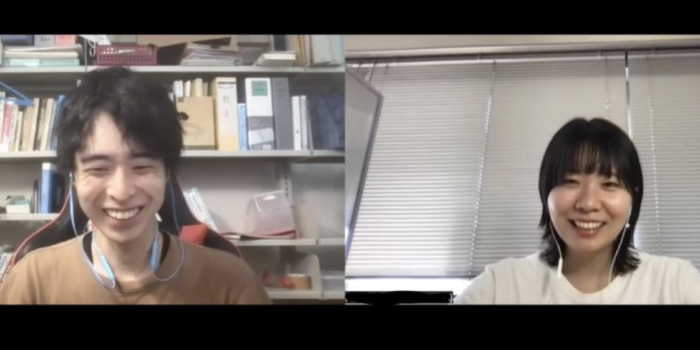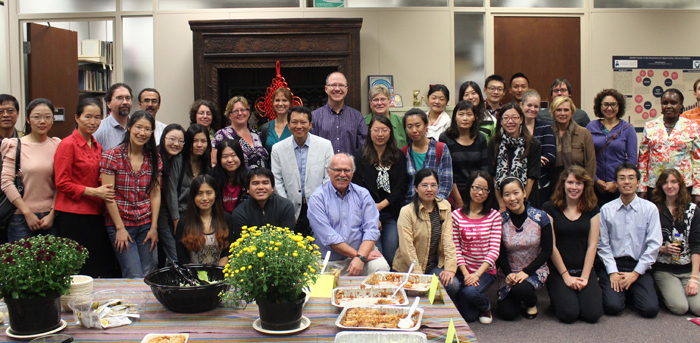On June 20, 2024, Kobe University’s Graduate School of International Cooperation Studies (GSICS) hosted a highly anticipated hybrid seminar titled “Global Development Challenges and the Role of the World Bank.” Co-hosted by Kansai JASID and Kobe University Campus Asia, the event took place in the Main Conference Room and drew a large audience, attracting participants not only from Japan but also from China, the UK, and Rwanda via Zoom.
The seminar commenced with a welcome speech by Professor Keiichi Ogawa, who introduced the distinguished speakers.  The first presentation was given by Mr.Hideaki Imamura, Executive Director for Japan at the World Bank. Mr. Imamura discussed “Working for Sustainable Solutions that Reduce Poverty in Developing Countries,” providing an overview of the World Bank Group (WBG). Established in 1944, the WBG is a multilateral development bank comprising 189 member countries with staff from over 170 countries and offices in more than 130 locations. He highlighted the Bank’s mission to “end extreme poverty and boost shared prosperity on a livable planet,” and detailed its extensive fields, sectors, and expertise. Mr. Imamura also shared insights on Japan’s journey with the WBG, transitioning from a borrower to a key partner.
The first presentation was given by Mr.Hideaki Imamura, Executive Director for Japan at the World Bank. Mr. Imamura discussed “Working for Sustainable Solutions that Reduce Poverty in Developing Countries,” providing an overview of the World Bank Group (WBG). Established in 1944, the WBG is a multilateral development bank comprising 189 member countries with staff from over 170 countries and offices in more than 130 locations. He highlighted the Bank’s mission to “end extreme poverty and boost shared prosperity on a livable planet,” and detailed its extensive fields, sectors, and expertise. Mr. Imamura also shared insights on Japan’s journey with the WBG, transitioning from a borrower to a key partner.
The second speaker, Ms. Keiko Inoue, Practice Manager for Education in the South Asia Region at the World Bank, addressed “Why Invest in People?” She emphasized the importance of human capital in driving econo mic development, particularly in South Asia. Ms. Inoue noted that countries with higher human capital levels experience greater economic development, and underscored the potential for human capital to significantly impact South Asia’s economic growth. She presented concerning statistics, such as the South Asia region’s human capital index of 0.48 and a utilization-adjusted HCI of 0.24, highlighting persistent inequalities, especially for girls and women. Ms. Inoue also shared her experiences working in India and Sri Lanka, emphasizing the need to address these disparities to break inter-generational cycles of lost opportunities.
mic development, particularly in South Asia. Ms. Inoue noted that countries with higher human capital levels experience greater economic development, and underscored the potential for human capital to significantly impact South Asia’s economic growth. She presented concerning statistics, such as the South Asia region’s human capital index of 0.48 and a utilization-adjusted HCI of 0.24, highlighting persistent inequalities, especially for girls and women. Ms. Inoue also shared her experiences working in India and Sri Lanka, emphasizing the need to address these disparities to break inter-generational cycles of lost opportunities.
The final presentation was delivered by Mr. Koichi Omori, Senior External Affairs Officer at the World Bank Tokyo Office, who spoke about “Career Opportunities” at the World Bank. He detailed various programs and positions available, including the Young Professional Program (YPP), Junior Professional Associate (JPA), Mid-Career (MC) roles for Japanese nationals, Junior Professional Officer (JPO) positions for Japanese nationals, and internships like the Bank Intern Program and Treasury. Mr. Omori advised participants on how to find job openings on the World Bank website, the importance of thoroughly reading the Terms of Reference (TOR), and fulfilling position requirements. He also recommended creating a LinkedIn account to expand one’s professional network.
World Bank Tokyo Office, who spoke about “Career Opportunities” at the World Bank. He detailed various programs and positions available, including the Young Professional Program (YPP), Junior Professional Associate (JPA), Mid-Career (MC) roles for Japanese nationals, Junior Professional Officer (JPO) positions for Japanese nationals, and internships like the Bank Intern Program and Treasury. Mr. Omori advised participants on how to find job openings on the World Bank website, the importance of thoroughly reading the Terms of Reference (TOR), and fulfilling position requirements. He also recommended creating a LinkedIn account to expand one’s professional network.
The seminar concluded with a lively question-and-answer session, where both online and on-ground participants engaged actively. The speakers graciously responded to numerous questions, providing further insights and motivation for students aspiring to work with the World Bank. This seminar not only inspired future development professionals but also offered a deeper understanding of global development challenges and the pivotal role of the World Bank in addressing them.

Authored by Htet Myet Aung (Master’s student)
Related










